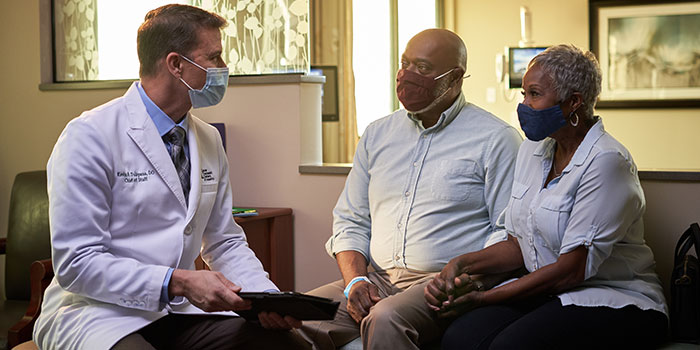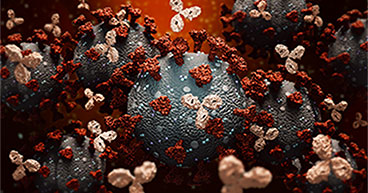
Immunotherapy is used to treat many forms of cancer, including lung cancer. Its goal is simple: to teach your body's immune system to recognize and fight cancer cells.
More conventional treatments, such as chemotherapy and radiation therapy, attack lung cancer cells in ways that risk affecting both cancerous and healthy cells alike. Immunotherapy, on the other hand, helps your body fight cancer using its natural defenses, which means it has the potential to be a more effective treatment option, sometimes controlling the disease for years.
Patients diagnosed with lung cancer frequently come to us wondering whether this new treatment is the magic pill they've read or heard about and whether it’ll work for them. What we say to them is that immunotherapy has been shown to take an active cancer and turn it into a controllable disease for some patients, but it doesn’t work for everyone.
That's because lung cancers vary from person to person. The appropriate treatment for a patient depends on the type, stage, molecular characteristics and aggressiveness of each particular lung cancer, and whether the disease has metastasized (spread) to other areas of the body.
With that in mind, this article answers questions about immunotherapy for lung cancer, including:
- What is immunotherapy for lung cancer, and how does it work?
- What are the benefits of immunotherapy treatment for lung cancer patients?
- What are the side effects of immunotherapy for lung cancer?
- Who is a candidate for immunotherapy?
- What should I do if I'm interested in immunotherapy treatment for lung cancer?
If you're interested in learning whether you're a candidate for immunotherapy, or if you'd just like to talk with someone at Cancer Treatment Centers of America® (CTCA) about your treatment options, call us or chat online with a member of our team.
What is immunotherapy for lung cancer, and how does it work?
A common misconception among cancer patients is that cancer cells are almost indestructible and hard to fight. The reality is that cancer cells are like any other cells except for the fact they contain some mutated DNA that allows them to keep dividing rapidly. This means that cancer cells are just as defenseless against the body's immune system as any other cell, with one exception: They have the ability to deceive the immune system.
To better understand this, think of the immune system as the police force that, day and night, patrols your body looking for problems. Frequently, infections and diseases get picked up, and the immune system creates antibodies or calls up other proteins or cells, such as T-cells (T lymphocytes), to eliminate the foreign substance (or antigen).
The problem with cancer cells is that, because they’re the body’s own cells that have mutated, they have the ability to disguise themselves as normal lung cells. It's as if they had an ID badge, and when they bump into these T-cell policemen (which happens all the time), they flash it to prove they’re a healthy part of your body. The policeman checks the ID and moves on by. Or, in more technical terms: The mutated cells are expressing enough normality that the immune system doesn't see a problem and leaves them alone.
This is where immune drugs called checkpoint inhibitors come into play.
What are immune checkpoint inhibitors?
Most of the time, cancer cells bump into the immune system at locations called “checkpoints,” or PD-1 and PD-L1 receptors—much as if they were driving down the street and a policeman stopped them to make sure they’re allowed in that area of town.
When they arrive at these checkpoints, cancer cells simply show their ID badges and evade the immune system. What immune checkpoint inhibitors do is get in the way of that interaction. They help your immune system recognize that, in fact, that cancer cell is not a normal lung cell, and it needs to be eliminated.
Checkpoint inhibitors block the signal between lung cancer cells and your immune cells that’s interfering with your body's ability to identify cancer cells as harmful. This triggers an immune response that causes the body to immediately release T-cells to attack and destroy the cancer cells.
Common checkpoint inhibitors used to treat lung cancer include:
- Pembrolizumab (Keytruda®)
- Nivolumab ( Opdivo®) This checkpoint inhibitor is sometimes used in combination with another immune drug called ipilimumab (YERVOY®)
- Atezolizumab (Tecentriq®)
- Durvalumab (Imfinzi®)
What are the benefits of immunotherapy treatment for lung cancer patients?
When patients ask me what the benefits of immunotherapy for lung cancer are, I usually answer with another question: What better way to help your body get back to health from cancer than using your own natural defenses?
Teaching your body's immune system to recognize and destroy cancer cells is a less toxic way of treating lung cancer, one that has a lower chance of harming healthy cells.
Another benefit of immunotherapy is that it can, for some patients, be kept up for a long time. Patients who see good results fighting their lung cancer with immunotherapy can sometimes continue receiving the treatment for years with fewer immediate and long-term side effects than those experienced by patients undergoing conventional therapies (e.g., chemotherapy or radiation therapy.)
In some instances, patients stop immunotherapy for a time, and when we perform periodic computed tomography (CT) scans, we see no sign of cancer cell activity or growth. This happens for a small percentage of immunotherapy patients, but it does happen. In other cases, while the cancer might not go away forever, immunotherapy may help keep it under control.
According to a recent American Cancer Society (ACS) report, the cancer death rate across the United States has steadily dropped since its peak in 1995. The ACS reports that the decline has recently begun accelerating—dropping approximately 2.5 percent a year since 2016, with reductions in the number of lung cancer deaths accounting for almost half the total drop in the cancer death rate from 2014 to 2018. This may be at least partially due to the approval of immunotherapy treatments by the U.S. Food and Drug Administration (FDA).
In my career as an oncologist, I’ve seen no bigger advance in treating cancer than immunotherapy. After years of clinical trials, the FDA approved pembrolizumab and nivolumab for the treatment of patients with metastatic non-small cell lung cancer (NSCLC). Since then, studies have shown an increase in overall survival rates and in progression-free survival of patients with NSCLC who are treated with immunotherapy.
What are the side effects of immunotherapy for lung cancer?
The majority of patients receiving an immunotherapy treatment to fight lung cancer experience few side effects. That said, some patients do experience side effects—usually mild—that are often associated with an overactive immune system. This is a possible consequence of using immunotherapy drugs to boost your body's defenses.
The most common side effects patients experience while receiving treatment include:
- Fatigue
- Skin rash
- Diarrhea
- Overactive or underactive thyroid
- Inflammation in the lungs and/or liver
While most doctors are familiar with the side effect profiles of chemotherapy or targeted therapy drugs, many are less familiar with immunotherapy side effects, and they may be more difficult to spot than those caused by conventional treatments. When patients do experience side effects, we usually stop treatment, administer steroids and evaluate whether they can tolerate further treatment with immune drugs.
At CTCA®, we only treat cancer, so our doctors and care team are attuned to immunotherapy toxicities and are better able to pinpoint them and quickly mitigate their effects when they happen. Patients at CTCA also have access to integrative care services that provide supportive care therapies, such as nutritional support, pain management and behavioral health services, which are designed to prevent and manage side effects associated with cancer and its treatment.
Who is a candidate for immunotherapy?
Immunotherapy is used to treat patients with stage 3 or stage 4 lung cancer. Patients with advanced non-small cell lung cancer or small cell lung cancer may be eligible. The first step to determining whether you’re a good candidate may be to undergo advanced genomic testing and PD-L1 testing.
With genomic testing, a pathologist runs an analysis of the molecular aspects of the DNA of the tumor cells taken from a biopsy to find out what type of mutations or alterations they express, and then looks for a match to therapies shown to be effective for those mutations. This analysis could reveal a match for a targeted therapy, but in the case of immunotherapy for lung cancer, your pathologist will look for PD-1 and PD-L1 immune markers, which detect how sensitive cancer cells may be to checkpoint inhibitors.
Results for this specific genomic test come back in the form of a percentage. If the result is above 50 percent, you may be able to be treated with immunotherapy alone. If it’s below 50 percent, you may be better suited for a combination of immunotherapy and chemotherapy.
Who isn't a good candidate for immunotherapy?
If your genomic test shows your cancer cells have an epidermal growth factor receptor (EGFR) mutation, your lung cancer may be treated with a targeted therapy drug instead. In the cases in which targeted therapy doesn't work, or stops working, immunotherapy may be used as a secondary treatment option later.
Patients with autoimmune diseases, such as multiple sclerosis, Crohn's disease, rheumatoid arthritis and lupus, also may not be good candidates for immunotherapy.
As we explained above, immunotherapy drugs ramp up your immune system, which may be a problem for people whose immune system is already overactive, as is the case with patients suffering from autoimmune diseases.
That said, there's ongoing research testing the use of immunotherapy drugs on cancer patients with preexisting autoimmune diseases, so if you’re such a patient, this doesn't necessarily mean you’re not eligible to receive immunotherapy. We recommend you consult with your physician and have him or her weigh the risk.
What should I do if I'm interested in immunotherapy treatment for my lung cancer?

Immunotherapy has quickly become a standard treatment for lung cancer, which means your oncologist will be very familiar with it. Ask your doctor whether immunotherapy would be a treatment option for your particular type and stage of lung cancer.
If you haven't already, try to get access to genomic testing to see which mutation (changes) and biomarkers your cancer cells express. That analysis will in turn help you and your doctor narrow down appropriate treatment options.
You may also want to consider getting a second opinion. Many patients come to CTCA for a second opinion to get a better understanding of their lung cancer. Our cancer experts have access to a wide range of diagnostic technology tools and comprehensive treatment options, such as genomic testing, targeted therapy and clinical trials. We also offer a personalized approach to cancer care and a team of multidisciplinary experts to help you prevent or manage the side effects of the treatment or the cancer itself.
Immunotherapy has changed oncology and the treatment of lung cancer ever since its approval and initial implementation. Immune drugs' side effects are, in most cases, mild compared to those of other conventional treatment options and usually facilitate a better quality of life for patients.
Ongoing advances in immunotherapy, such as the use of combinations of immune drugs taken together, give us hope that one day, immunotherapy will allow a majority of advanced-stage lung cancer patients not only to survive their cancer, but thrive.
If you’re interested in getting a second opinion for lung cancer, or if you’d just like to talk with someone at CTCA about your treatment options, call us or chat online with a member of our team.



